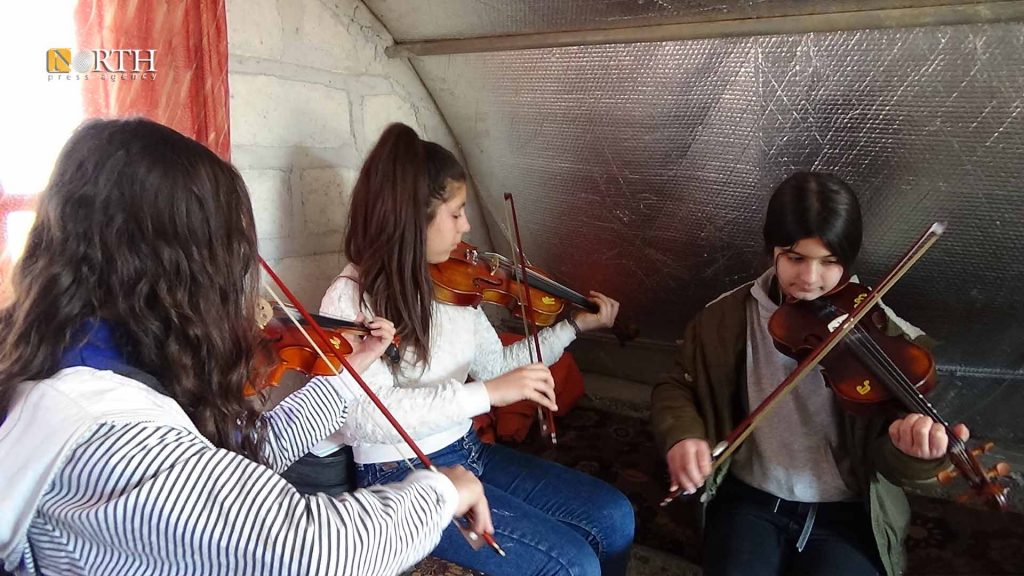ALEPPO NORTHERN COUNTRYSIDE, Syria (North Press) – The 15-year-old Bariana Sido, an IDP from Afrin, is doing her best to teach other girls what she learnt about playing violin, in the absence of music centers and musicians to teach them music.
In a small tent in Sardam camp for Afrin IDPs in the northern countryside of Aleppo, north Syria, the girls gather to play the violins they carried with them when they fled from the Turkish aggression nearly four years ago.
Bariana’s family with more than 300,000 people fled Afrin as a result of a military operation launched by Turkish forces with the support of the Turkish-backed armed Syrian factions in 2018.
Consequently, a part of the Afrin IDPs resorted to camps including al-Awda, Afrin, Barkhodan, Sardam, and Shahba while others resorted to 42 villages and towns in the northern countryside of Aleppo, in addition to some others displaced to cities of the Jazira, Kobani and other areas in Syria.
According to statistics of the Social Affairs and Labor Board of Afrin, which is currently operating in the northern countryside of Aleppo, 2,000 displaced families from Afrin are distributed in the five camps, and about 140,000 people are in neighboring villages and towns.
In the northern countryside of Aleppo, where there are many areas of influence, the displaced families suffer from difficult living situations due to the Syrian government’s control of entry barriers and the imposition of royalties on any shipments coming from Jazira or the city of Aleppo.
But all this did not prevent the girls from striving to develop their talents and practice playing violin that brought them together under a tent here.
Passion for playing
At the age of ten in Afrin, Bariana started singing before learning to play, as her sisters, who had mastered playing several instruments, were around her at the time.
She told North Press that the circumstances encouraged her to sing songs and start learning to play later.
She is now giving theoretical lessons to 28 children who are being prepared to learn to play the violin, all from displaced families living in camps or nearby villages.

She also supervises practical training for eight girls who are trying to learn on their own and in partnership.
The lesson program includes two hours per week of theoretical notes lessons and practical exercises.
With the beginning of the new year 2022, Bariana hopes that the war will end and she will return with her colleagues and displaced families to her homes to achieve her dreams and develop her talent there.
In 2018, the family of the 14-year-old Lorin Kor Abdo fled the city of Jindires, but the girl didn’t left her violin behind.
She said she started learning to play at the age of 10, but the Turkish attacks began just nine months after she attended the Music institute in Jindires.
Lorin now lives in Ahdath village in the northern countryside of Aleppo, and she is one of the eight girls who train with Bariana.
Music centers in IDP camps
The tent in which the girls train is a center affiliated with al-Hilal al-Zahabi (Golden Crescent), a women’s cultural institution interested in Kurdish music and heritage, but it is also suffering from a lack of resources due to displacement.
Mizgin Joulaq, the administrator in the Golden Crescent, said the girls participated in several celebrations and holidays in the camps, including Newroz day and Women’s Day, in addition to playing during cultural weeks that included traditional and musical performances.
She added that the girls were able, despite the difficulties of displacement, to master playing several Kurdish, Arab and foreign songs.
My books and violin
The scenes of destruction, the journey of displacement, and the stories of the victims have their impacts on Lorin’s memory, as she had forgotten what she learnt during nine months at the music center.
“But here I met Romina, Bariana’s sister, who started training us all over again.”
In addition to the two hours of training with the girls at the camp, Lorin follows a self-training program and takes online classes in her house.
“During my displacement trip ,my violin was with me. My violin shares me all my pain.”
The 13-year-old Arya Krad, another girl in the group, recalls that the first thing she did before leaving Afrin was taking her books and the violin.
“I didn’t leave my violin behind in Afrin, I brought it with me, I complete my rehearsal here in the camp.”
Arya says she feels sorry for what happened to her area and its residents, and that she expresses her feelings by playing and singing.
“After I was displaced, I lost my friends and teachers. I always talk about them, but I don’t know where they are, I hope to meet again in Afrin.”
